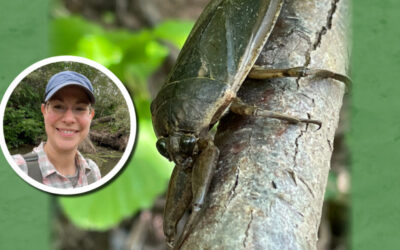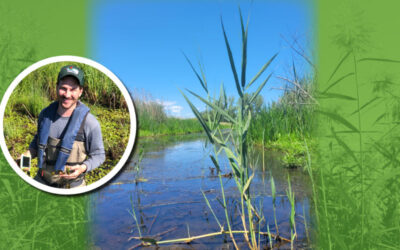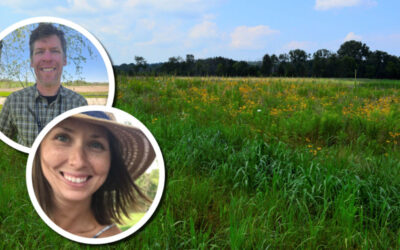Wetland Coffee Break
The Wetland Coffee Break series helps keep our community of wetland lovers connected and learning about wetlands throughout the year, from anywhere! Bring your coffee and learn about wetlands, the plants and animals that call them home, and the many natural benefits they provide to our communities. Sessions are held on Zoom and feature time for audience Q&A.
See below for a list of upcoming presentations and to register. Once you register, you’ll receive an automatic email including the URL link and password you’ll need to access the meeting. We record and post each presentation so you can watch any that you missed live. You’ll find links to these recordings below, and you can also find them on our Facebook page.
We are grateful to all of the presenters for sharing their knowledge and expertise and to everyone interested in learning more about wetlands! If you are interested in giving a Wetland Coffee Break presentation, or if you have a wetland topic you’d like to see covered, please contact Katie.Beilfuss@wisconsinwetlands.org.

Register for a Wetland Coffee Break
Wetlands in Wisconsin’s mega moraines
Friday, July 26, 2024
10:30 am CT
Description
One of the largest concentrations of wetlands in our state is found in a unique area of large hummocky moraines that spans across north-central Wisconsin. We will explore the origin of this unusual glacial landscape and how it gave rise to thousands of internally-draining (“isolated”) wetlands.
Dr. Nelson Ham studies the origins of Wisconsin’s landscapes, especially those formed during the last ice age. He earned his PhD at the University of Wisconsin-Madison and has taught at St. Norbert College in DePere for the past 30 years.
Blanding’s turtle: A true wetland denizens
Friday, August 2, 2024
10:30 am CT
Description
Blanding’s turtles are true denizens of wetlands, traveling among wetlands to complete their life cycle, but also traveling long distances on dry land to nest. They take an extremely long time to reach sexual maturity (17 – 20 years in Wisconsin) but can live as long as humans. Join Rebecca Christoffel to learn more of the fascinating life history of Blanding’s turtles as well as some current conservation efforts underway to help their populations.
Rebecca Christoffel is the Co-Director of Turtles for Tomorrow (turtlesfortomorrow.org), a non-profit dedicated to the conservation and management of Wisconsin’s rare amphibians and reptiles, particularly turtles. Prior to her involvement in Turtles for Tomorrow, she was a faculty member and Extension Wildlife Biologist for Iowa State University.
Wetlands and dry roads: Restoring the Yellow River watershed in central Wisconsin
Friday, August 9, 2024
10:30 am CT
Description
A partnership in central Wisconsin is working together to enhance the community’s resilience to future extreme weather events and to simultaneously improve water quality and enhance wildlife habitat. Together, the partners (including US Fish & Wildlife Service, WDNR, local government, NGOs, and school groups) are planning, implementing and monitoring the restoration of the Little Yellow River and its watershed in northern Juneau County. Disabling the extensive network of drainage ditches and constructing resilient transportation infrastructure will provide immediate downstream effects, long-term value to the local residents, and a cascade of biological benefits to natural communities and species (including Whooping Cranes!).
Brad Strobel has been a wildlife biologist with the U.S. Fish & Wildlife Service for nearly 15 years. During this time, he has worked on a variety of species on both ends of the Mississippi Flyway. In his free, time Brad enjoys woodworking and backpacking with his wife and 2 boys.
Immediate avian response to restoration in Lower Green Bay
Friday, September 6, 2024
10:30 am CT
Description
Lower Green Bay was once recognized as one of the most productive locations for birds and other wildlife in the Great Lakes, but during decades of severe impacts including industrialization and invasive species colonization, use of the area by migrating and breeding birds plummeted. However, restoration projects in the past decade, including the Cat Island Restoration Project and Ken Euers Nature Area Restoration, have already showcased positive responses from migrating and nesting birds, including Federal and State listed species, demonstrating that “if you build it, they will come.” Join Tom Prestby of Audubon Great Lakes to learn about details of the immediate avian response to restoration at Cat Island and Ken Euers. Tom will also discuss long-term management challenges to ensure restored habitat remains ideal for bird use in an age of invasive species and climate change impacts.
Tom Prestby is the Wisconsin conservation manager at Audubon Great Lakes. He manages habitat restoration projects and bird research, monitoring, and stewardship projects in Wisconsin, particularly in Audubon’s strategic priority areas of Green Bay and the St. Louis River Estuary and in the Important Bird Area Program. Tom is based in Green Bay, WI.
An introduction to Wisconsin’s wetland-loving snakes
Friday, September 20, 2024
10:30 am CT
Description
In this session, Rebecca Christoffel will get us acquainted with the 8 species of snake in Wisconsin that spend time in wetlands for at least part of the year and how to identify them. This session is geared toward individuals who are interested in learning how to identify one snake from another either through photographs or personal encounters in the field and will highlight our snakes associated with wetlands.
Rebecca Christoffel is the Co-Director of Turtles for Tomorrow (turtlesfortomorrow.org), a non-profit dedicated to the conservation and management of Wisconsin’s rare amphibians and reptiles, particularly turtles. Prior to her involvement in Turtles for Tomorrow, she was a faculty member and Extension Wildlife Biologist for Iowa State University.
New general permit to promote hydrologic restoration of streams, wetlands, and floodplains in Wisconsin
Friday, October 4, 2024
10:30 am CT
Description
In May 2021, the Wisconsin legislature, working with Wisconsin Wetlands Association, other external stakeholders, and Wisconsin DNR, passed WI Act 77, which required the DNR to develop a Hydrologic Restoration General Permit (HRGP). The permit will utilize integrated and flexible review requirements for a variety of wetland and stream related regulations so long as an applicant is able to demonstrate that the proposed activities will achieve improvements to wetland, stream, and watershed health. It is hoped that the flexibilities offered through the HRGP will accelerate the implementation of voluntary wetland, stream, and floodplain restoration and management projects. This presentation will provide an overview of the HRGP conditions and the intended uses for the permit.
Tom Nedland is a Professional Wetland Scientist with more than 20 years of experience in the wetland science and regulatory realm. During his time with the Wisconsin DNR, Tom has held positions in the Waterways Program conducting wetland and waterway permitting and serving as DNR’s wetland delineation and wetland mitigation expert. Tom is currently the Section Manager for the Waterways Program’s Policy and Professional Services Section.
Helping farmers, saving cranes
Ryan Michalesko, International Crane Foundation
Friday, October 18, 2024
10:30 am CT
Description
The story of the Sandhill Crane (Grus canadensis) is one of true conservation success. Only recently, the species—one of the oldest on the planet—was nearly extirpated (regionally extinct) in the Midwest. Sandhill Cranes are thriving due to a mix of factors, including better wetland protection and management, as well Sandhill Cranes’ shift to agricultural crops after losing their natural grassland habitat. Modern row crop farming practices have created an easy way for cranes to locate food in the form of germinating corn seed during the breeding season, causing significant damage to corn crops. Ryan Michalesko will discuss how the International Crane Foundation is expanding its efforts to find real solutions to support farmers while also protecting cranes and the landscape.
Ryan Michalesko works as the Landowner Engagement Specialist on the North America Program team at the International Crane Foundation. Through the involvement of farmers and other key parties, Ryan is working to innovate solutions to crop depredation by Sandhill Cranes. He earned his bachelor’s degree in Natural Resources Planning and master’s degree in Natural Resources Policy from UW-Stevens Point.
Draft wetland functional assessment tool for Wisconsin and Minnesota
Friday, November 1, 2024
10:30 am CT
Description
The Wisconsin and Minnesota Wetland Rapid Assessment Methods (RAM) are currently used to evaluate wetland function and inform some regulatory and mitigation decisions. Supported by US Environmental Protection Agency wetland development grant funding, state agencies in Minnesota and Wisconsin are working jointly to update their RAM with a quantitative tool that evaluates several wetland functions, including water quality, hydrology, ecology, and human use values. Presenters will discuss the strategy for developing the new tool and show current tool functions, data sources, and plans for field testing and public input.
Tom Pearce received a master’s degree in urban and regional planning and a master’s degree in water resources management from UW-Madison. Tom has worked for the Wisconsin Department of Natural Resources (WDNR) for the past five years coordinating policy and administration of the state wetland regulatory program. Prior to working for WDNR, Tom spent five years working in environmental education and conservation leadership.
Aerial herbicide application on invasive wetland plants: Planning, process and lessons learned
Jason Fleener, Wisconsin Department of Natural Resources
Friday, December 6, 2024
10:30 am CT
Description
Wisconsin DNR has contracted aerial herbicide application services for several years to combat invasive phragmites, cattail, and other wetland invasive plant species. Jason Fleener, wetland habitat specialist with WDNR, will outline the various steps to plan out and implement a successful spraying project, discuss how to choose the best method for application (helicopter or drone), and how to choose the right chemicals for a project. He will also share the results of treatments and lessons learned.
Jason Fleener is the statewide Wetland Habitat Specialist in Wisconsin DNR’s Bureau of Wildlife Management. He has 13 years of experience in this program overseeing wetland habitat program delivery on DNR managed lands, including hydrologic restorations, wetland infrastructure management, habitat prioritization, wild rice conservation, and wetland grant program support.
Watch previous presentations
Click “Older Entries” below to see more past presentations, or view our Google Sheet index of past presentations here.
Wetland Coffee Break: On, in, and underwater: Life cycles and life history of wetland invertebrates
Join Dr. Jessica Orlofske of UW-Parkside to learn about Wisconsin’s wetland invertebrates that skate on the surface, swim in the water column, or crawl along the substrate.
Wetland Coffee Break: Wetlands and Phragmites: Management at a landscape scale
Presenter Matt Puz discusses wetland dynamics as well as Phragmites biology and ecology, and how understanding these two concepts can lead to more effective management.
Wetland Coffee Break: Restoring wetlands in the Mukwonago River watershed
Hear about the the experience of project planning, restoration, and maintenance of the Mukwonago Davis Restoration Project, and the trials and tribulations of implementing a large wetland restoration project through key partnerships.
Wetland Coffee Break: Let’s talk turtles!
Ever wonder what kind of turtle you just found crossing the road, or how to tell one kind of turtle from another, or where to look to find them?
Wetland Coffee Break: What’s the buzz? Drone uses in wetlands
Drones can do a lot more than take pretty pictures. We can now utilize drones for high-resolution imagery, artificial intelligence, spraying invasive species, or seeding native species.
Wetland Coffee Break: Floristic quality benchmarks for rare and unique wetland plant communities
Ryan O’Connor (WDNR) shares what makes rare wetland plant communities like white pine-red maple swamps and interdunal wetlands unique, what threats they are facing, and more.






